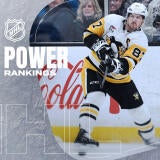Do Kings have advantage over Devils when it comes to travel?
The teams in the West travel a lot, those in the East, especially the Atlantic Division, don't. Is that actually an advantage for L.A. now?


LOS ANGELES -- There are a lot of new challenges that present themselves to the teams in the Stanley Cup Final.
There is a tremendous increase in responsibilities with the media, for one. The scrums are so big the players routinely take 15 or so minutes to answer questions, a lot they answer three or four times for reporters who didn't hear the first time. To their credit, the players are almost always gracious about it and willing to indulge.
Another one of the challenges that arises is the travel. At no time in the season, not even in the Western Conference, do they get yanked back and forth so much as to resemble a cross-continent yo-yo.
But at least the teams in the West have an idea of what it's like. That's life for a lot of the teams, and it's one of the big complaints you hear whenever realignment is brought up, in fact. It's not fair that the Western Conference teams have to travel so far to play conference games in comparison to the East.
Consider that the Kings already went through a series with a team in St. Louis, which isn't nearly as far away as New Jersey is but isn't exactly down I-5 either.
| NHL Playoffs | ||
|
||
| More NHL coverage | ||
"I think we're probably a little more conditioned to the travel," Kings captain Dustin Brown said. "Getting up today, I've done this 10, 12 times this year, getting home at 3:00 in the morning and having to get up the next day."
But not the Devils. Case in point: When the Devils flew to L.A. for Game 3 it was the first time they needed to board an airplane since they won Game 7 at Florida in the opening round. They only had 2/3 of the planes, trains and automobiles covered.
So the question is: does it really matter? Can we expect to see fatigue with less than 48 hours between games 3,000 miles apart?
"We got in 3:30ish our time, so it wasn't too bad. The time change made it feel like it was a bit later than it actually was," Mike Richards, a guy who has been on both sides of the conference travel, explained. "We were excited obviously on the plane, slept a little bit there and got some pretty good sleep last night. The excitement of it is keeping me going."
But that's from a guy on a team that's been there, done that. What about the Devils? Let's just say Andy Greene wasn't ready to start making excuses.
"You can say time changes all you want, but we're professionals and we've got to handle this," Greene said Sunday afternoon, just a few hours after the Devils arrived in Southern California and then practiced.
"I thought there was good energy out there today in practice," Greene continued. "Guys are ready. It's not that time of year where you can sit there and feel tired. There's not much left here and we've got to make sure we're ready."
When you start going down the list of variables that will affect this series, those intangibles that you can't possibly quantify but people (I'm not naming any names) try to anyway, this is something akin to poor ice conditions. It's something both teams are dealing with it.
I could very well turn the argument around and say that the Devils are better prepared for the travel in this series because they haven't traveled much at all in the last month or so. They aren't road weary (of course, since the Kings have manhandled the rest of the West they haven't been on the road a lot either).
Fact of the matter it's, as my old editor always used to bemoan to me, paralysis by analysis. When 5 p.m. PT rolls around on Monday night, the teams will both be ready.
For more hockey news, rumors and analysis, follow @EyeOnHockey and @BrianStubitsNHL on Twitter and like us on Facebook.

















